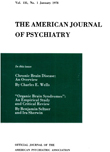A psychoanalytic approach to a therapeutic impasse with an impulsive adolescent: permission to speak the unspeakable
Abstract
The authors describe an impasse in the therapy of an impulsive, intermittently psychotic adolescent boy and demonstrate the usefulness of understanding the impulsive behavior according to the classical psychoanalytic definition of "acting out." Rather than being viewed as a random breaking through of impulses, this impulsive behavior can best be understood and clarified in the course of intensive psychotherapy as classical acting out under the influence of the therapy and the transference. With impulsive patients of this type they have observed a strong tendency to abandon this basic psychoanalytic formulation and the use of the verbal interventions that follow from them. Such patients often need encouragement to remember and express their painful feelings in words instead of repeating the entire emotional experience in action. The authors also describe the resistances within the treatment team that interfered with the development and utilization of this basic psychoanalytic formulation.
Access content
To read the fulltext, please use one of the options below to sign in or purchase access.- Personal login
- Institutional Login
- Sign in via OpenAthens
- Register for access
-
Please login/register if you wish to pair your device and check access availability.
Not a subscriber?
PsychiatryOnline subscription options offer access to the DSM-5 library, books, journals, CME, and patient resources. This all-in-one virtual library provides psychiatrists and mental health professionals with key resources for diagnosis, treatment, research, and professional development.
Need more help? PsychiatryOnline Customer Service may be reached by emailing [email protected] or by calling 800-368-5777 (in the U.S.) or 703-907-7322 (outside the U.S.).



